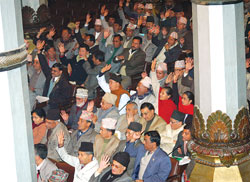|
|
Way ahead
Editorial in Kantipur, 16 January
That the Maoists returned to the same House of Representatives they abandoned a decade ago is proof that the country is heading in a new direction.
Sustainable peace and political stability will depend on how they play their role as another big parliamentarian party, almost as large as the UML.
The Maoists will make their mark on the world if they can successfully participate in a 21st century democratic parliament after waging a war based on 20th century communist ideology. The international community would thank and congratulate Nepal for its stable, modern democracy.
The Maoists must cooperate in the management of their arms and army. They will find it difficult to run political activities without guns, but the other parties cannot practice free and fair politics unless arms are taken out of the picture.
All parties are responsible for the plans envisaged in the new constitution. The interim government must create an environment for a free and fair election to the constituent assembly.
Trojan horse
Punarjagaran, 16 January
The Maoists have formally taken up the parliamentary procedures after 11 years of their 'People's War'. Political observers wonder whose victory this change of heart signifies: of parliamentarians over the Maoists, or of the Maoists in bringing the lawmakers over to their agenda.
Many question the government's willingness to let the Maoists into parliament before they surrendered their arms, and the Maoists' demand for a constituent assembly election. Never have armed communists demanded such an election.
This insistence on the best of democratic exercise by the very Maoists who fought to end democracy sounds like the story of the Trojan War translated into Nepali politics.
Here for good
Budhabar, 17 January
The 16-year-old constitution has been replaced by a new interim document. For the first time in the history of Nepal, the monarchy is defunct. The king's constitutional powers have been wiped out and the people's representatives have written an interim constitution.
Political parties, the international community, and civil society all hope for a better future for the country through this constitution. After this historic event, many believe that this change is here to stay.
Indian rescue
Deshantar, 14 January
Politicians in India are insisting that the monarchy remain in existence. The BJP recently sent a delegation to Nepal. Similarly, royal relative and Indian politician Karan Singh, who was sent to Nepal as a special envoy of the Indian prime minister during the April Uprising, will also arrive this week.
The BJP group led by Surendra Kumar Arora, the party's foreign affairs head, met Prime Minister Koirala last Friday. The group also met with former prime minister Surya Bahadur Thapa, RPP chairman Pashupati SJB Rana, and Maoist leaders Krishna Bahadur Mahara and CP Gajurel.
While the BJP wants Nepal to remain a Hindu kingdom, the new interim constitution isolates the king by seizing his constitutional powers. The failure of the king's 1 February 2005 takeover is largely attributed to the change in the government in India.
Though the BJP openly supports the king, the Indian government is silent on this matter and has made no statement about its views. India says it will accept the wishes of the Nepali people and political parties. Political analysts believe India's stance on the monarchy will play an important role in the king's survival.



